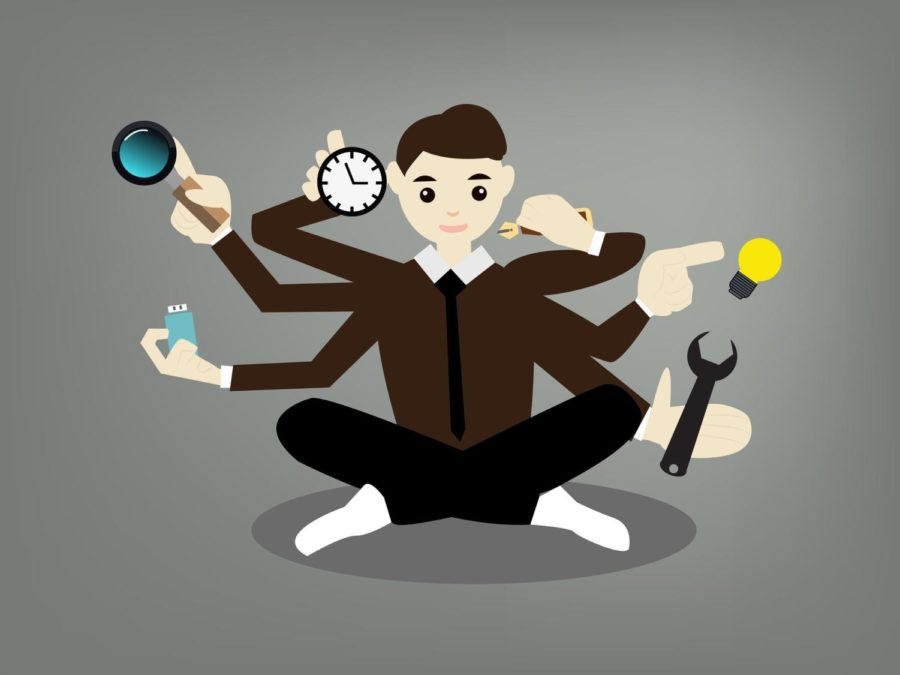The dangers of multitasking
Why monotasking ultimately benefits us
March 21, 2019
As soon as one hears a ¨ding¨ from their phones it’s like they’re automatically programmed to check it. Even as one is in class they react instantly and take out their phones trying to check the notification, but as soon as they do so they immediately hear a ¨focus¨, or ¨pay attention¨ coming from their teacher.
It’s honestly a common phrase that one hears throughout the course of their day. Whether one is in a learning environment and their instructor manages to see that their attention is slightly drifting off, or in other circumstances one even reminds themselves to focus, as they catch themselves getting distracted and remember their main task at hand.
The situation only worsens when technology is thrown into the mix. Multiple tabs are open on multiple devices; one is trying to read their email, as well as eagerly trying to text a friend; all while trying to finish homework.
In our technology-oriented society, many don’t have the time to settle down and work on a single thing at a time; people are often busy and assume that there’s only so much that can be achieved in twenty-four hours. This then pushes them to resort to multi-tasking, but the fact is your brain is not ¨designed to do more than one thing at a time.¨
When it comes to the iSchool, multi-tasking is a common thing throughout the student body.
As for Anna Lin, a sophomore at the iSchool, she reveals that, ¨multitasking is something I think I’m quite good at, and I do it because I have so many other things to do throughout the day with only a limited amount of time.¨
While there’s only about 2 percent of the world population that can actually multitask, for the 98 percent of us rather than performing multiple activities simultaneously, the brain is quickly shifting gears or task switching between two or more activities with ¨astonishing speed.¨
The brain can do this in about a tenth of a second, hence forcing individuals to come to the conclusion that they are carrying out two or more activities in unison.
What individuals seem to ignore is that doing this so quickly comes at a cognitive cost which, includes, ¨…, reduced time efficiency …and poorer decision-making.¨
Alongside these effects, multi-tasking also exhausts the brain, condemns us to ¨early mental decline and decreased sharpness.¨ What´s even more astonishing is the fact multitaskers are least likely to be productive, but they feel more ¨emotionally satisfied with their work¨, creating the illusion of productivity.
While many are oblivious to the harm that multi-tasking can cause, because it’s such a common occurrence, switching to mono-tasking or single tasking – as it is also referred to – is actually very beneficial.
¨Although I often multitask, when I´m doing one thing at a time or when I´m mono-tasking I feel calmer and more accomplished,¨ says Lin.
Mono-tasking hasn’t been as glorified as multitasking because multitasking is such a sought-after quality, but doing one thing at a time isn’t a new idea. When it comes down to mono-tasking, it is simply deriving one´s attention onto one subject at a time with limited distractions until the task at hand is complete, which ultimately sounds easy, but has proven to be quite challenging for those who are chronic multitaskers. While it’s easier said than done, it may also come off as a dull practice to many individuals.
Let’s say one had two tasks at hand, and each required an hour of careful attention and focus. Multitasking would be taking both of these tasks and trying to finish it in just one hour by constantly switching one´s focus between the two. This is obviously quite problematic because one is prone to making more errors; however, deriving one´s attention to each activity for an hour each will ensure that one has completed the task to the best of their abilities.
Mono-tasking actually helps people spend their time wisely, as it prompts them to prioritize their most important tasks. Additionally, not only does it help cut down careless errors in one´s work, but it can also save people a great deal of time, energy and results in better finished products.
Mono-tasking is probably something that won’t easily catch on due to everyone’s busy schedules, but simply making an attempt at trying to do one thing at a time can benefit us greatly in the long run.
Ultimately, multitasking trains our minds to think that we have really short attention spans, but the brain is “wired for deep and innovative thinking¨; however, that challenging to achieve if we´re trying to make it do multiple activities at once. This is where mono-tasking comes in.
So remember the next time you’re in a learning environment and your teacher tells you to “focus,” they’re telling you to do so because they want you to get the best out of the lesson, and if your trying to finish homework remember to always minimize distractions.


